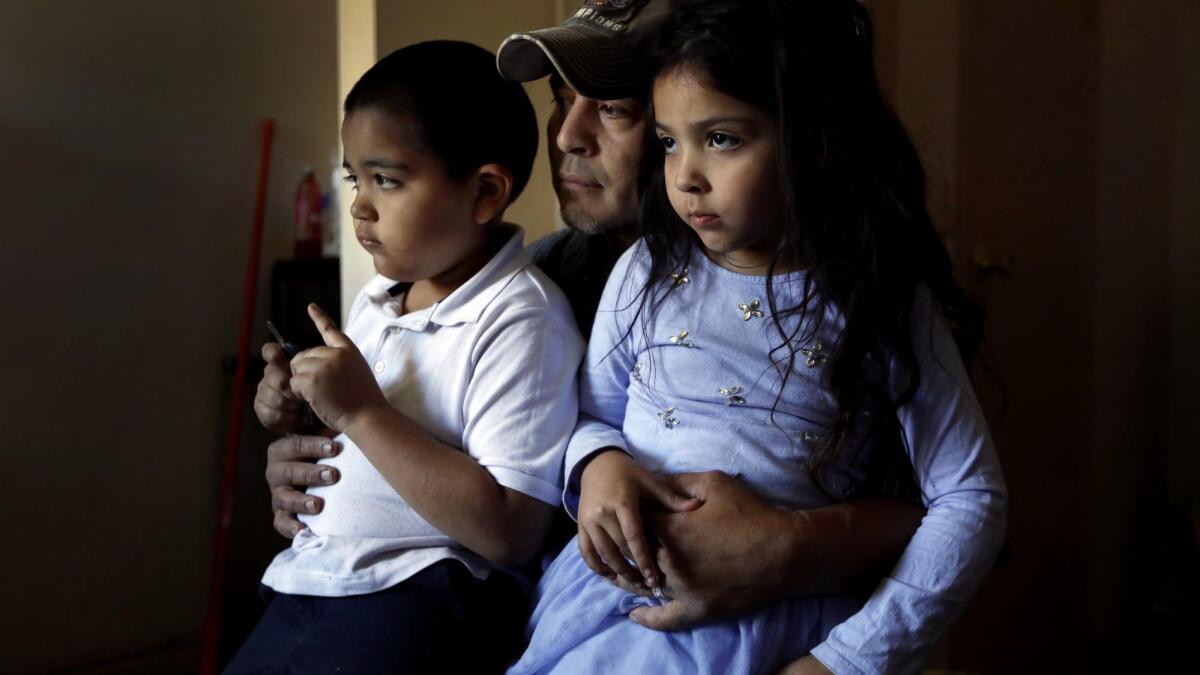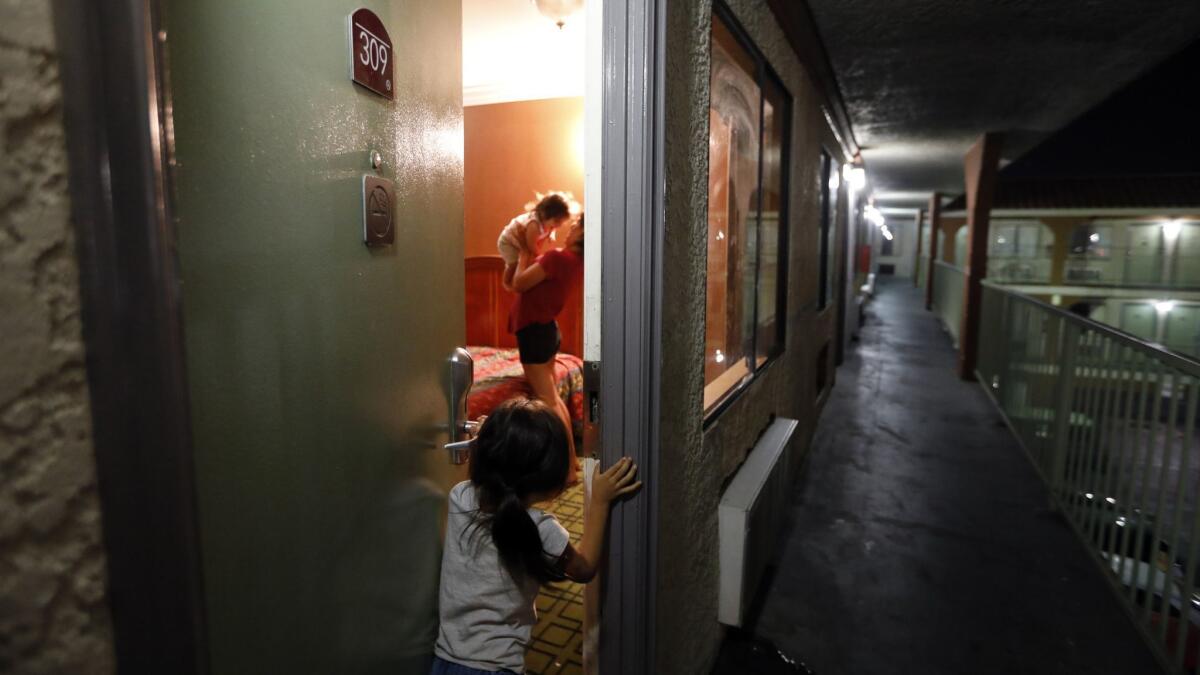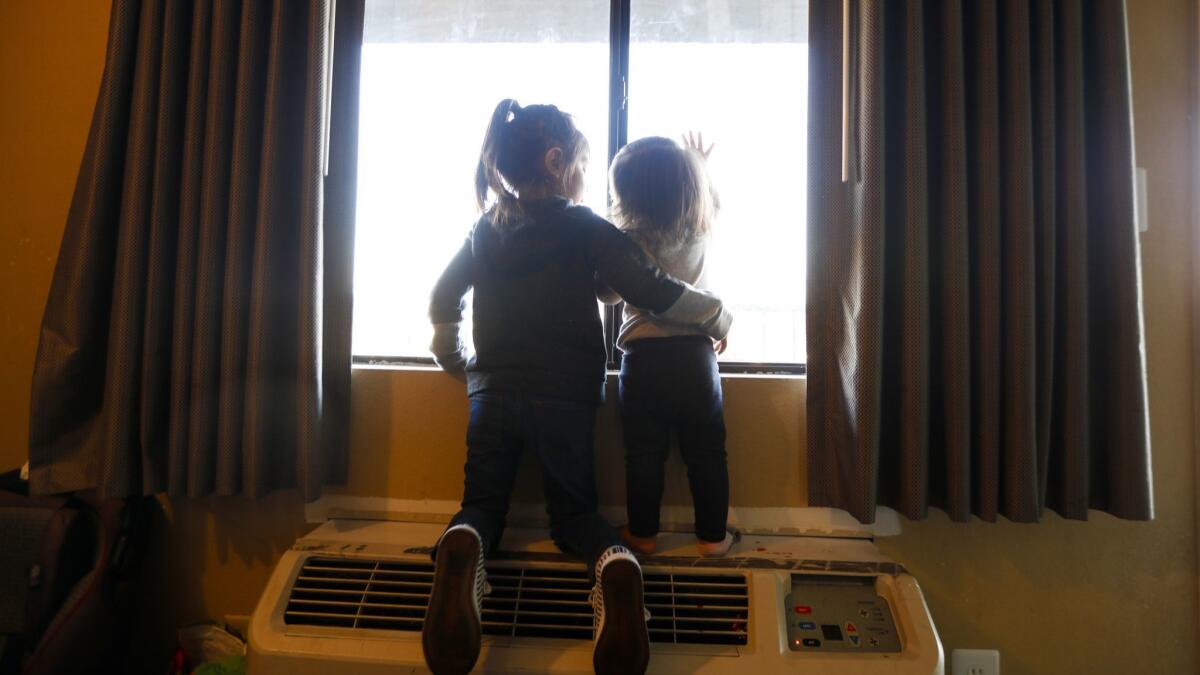Column: Some want to help kids trapped in poverty, while others question why parents had so many children

- Share via
Here’s the picture:
A poor young Latina mother stuck in a dumpy northeast San Fernando Valley motel, four kids, no car, barely surviving.
Some people take in the scene, and the story, and wonder how they can help. Can they donate shoes, clothes, food, money?
Others digest the same information and come up with a radically different set of questions. How could she be so irresponsible? Where’s the father? And why do poor people make such bad choices?
I heard it all last week after writing about Telfair Elementary School in Pacoima, where nearly a quarter of the students are homeless, and some of them live in garages, motels and shared homes.
Two readers wanted to pay for a year of housing for that family while others wanted to deport them to Mexico, which might have been a problem because Mom and the kids were all born here. Some of the emails were vulgar and racist, and I won’t waste time responding to those. But other readers were judgmental in softer tones, or were simply curious — from a place of compassion, I think — as to how someone in a hole could keep shoveling deeper.
“Why do these mothers and fathers continue to have babies when they know they cannot house or feed them?” asked one reader. “Is it tradition? Is it male macho decision-making? Is it religious training. … Is it young girls denied birth control and abortion services that have their first baby too early, and then have too many others?”
For starters, I agree. Having children before you can afford to adequately house, feed and care for them is probably not the best way to go. And even if you’re poor, you’ve got to take responsibility for the consequences of such a decision.
But I grew up in the middle class, and it strikes me as more than a little delusional to think people who have known nothing but struggle, trauma and hopelessness would see the world and plot their lives as I do from my comfortable perch.
Poverty is personal, complicated, defiant, irrational.
It suffocates and sabotages. It can motivate, but it knows better how to scar the body and rob the spirit.
We have an economy that has been carefully crafted to serve those at the top, and yet for many of those who struggle, even if they’re working, we have so much contempt. By the way, people of all income levels make decisions that might appear ill-advised or even crazy. And not all poor people of color remain poor, or make bad choices, or have a lot of kids, but we’re quick to wag a finger at those who do.
Two women in my series on Telfair Elementary were living in motels, one with four children and the other with five, and each had been criticized by friends or strangers for having so many kids. “It’s none of their business,” the first said of her critics, although I’m sure many would disagree, given the social costs borne by taxpayers.
The other woman had been sexually assaulted as a child, lost a father to murder and a mother to drug addiction. She told me she would never regret having her kids. I asked one of her nonprofit social service advocates about her, and he said that some women seem inclined to surround themselves with love that was missing when they were kids. The urge to feel loved, and needed, is a powerful human instinct.

Mary Patrice Erdmans is a sociology professor at Case Western Reserve University and author of “On Becoming a Teen Mom,” which studied the stories of 108 white, Latina and black teenage mothers. When I asked about poor women having children, Erdmans pounced.
“Do poor people not have the right to reproduce?” she asked.
Of course they do, I said. But I wanted to better understand the sociology and psychology of having children when doing so might severely limit opportunities for both parents and kids.
Erdmans said a lot of liberals ask this question, and they’re the ones who bug her the most. Instead of judging poor people for having babies, she said, why aren’t they talking about racism, housing shortages, income inequality, lack of healthcare access and other problems that make some women believe there’s never going to be a better time than now to have a child.
“The liberal perspective is to change peoples’ behavior rather than radically restructure society,” she said. “We know that when women are more economically stable and foresee more opportunities in their lives, they’re likely to postpone having children and they have fewer children. It’s because they have something else to do with their lives and see themselves in a different way.”
In her research for a book called “Promises I Can Keep: Why Poor Women Put Motherhood Before Marriage,” St. Joseph’s University sociology professor Maria Kefalas discovered something about poor white, black and Latina women that might seem counterintuitive to middle-class people.
“Poor women set a high bar for marriage, but they don’t have the same high bar for having children. Childbearing is something women with a lower education feel very confident they can do, and they believe it will make their lives more stable,” Kefalas said.
More stable?
“There are resources for mothers,” Kefalas said. “There’s help. There’s attention.”
That may not be the most rational thinking, but there’s more to it than that.
“There’s hope in a child,” Kefalas said. “There’s the promise of redemption in a child.”

There’s hope, too, in the generosity of those whose impulse is to help rather than to condemn. Last week, Telfair Principal Jose Razo fielded calls from people who wanted to donate money, clothing and supplies to his school. (Telfair’s donation fund pays for uniforms, science and tech programs, music and more. If you’d like to help, make out a check to Telfair Elementary School, write “donations” in the memo field and send it to: Telfair Elementary, 10975 Telfair Ave., Pacoima, CA 91331).
One reader helped set up a GoFundMe account for Brenda Salgado, one of the parents living in a motel. Salgado had hoped to move into stable housing because the motel’s nightly rate is expensive, but she had no credit and no money for a down payment, so she was relying on help from the kids’ father and government assistance while trying to make other arrangements. Two readers offered to pay for housing for the family for a year, and the Rev. Andy Bales of the Union Rescue Mission was trying to make that happen.
The bigger challenge, in a state that has the world’s fifth-largest economy and the nation’s highest rate of poverty, is figuring out how to make systemic changes that can affect millions of poor children rather than just a few.
On the last day of the Telfair Elementary series, L.A. schools Supt. Austin Beutner, school board member Kelly Gonez and Principal Razo sent a letter to L.A. Mayor Eric Garcetti, City Council President Herb Wesson and the L.A. County Board of Supervisors asking them to step up and help more with housing, counseling, healthcare and more.
Read L.A. school officials’ letter to Mayor Garcetti requesting resources for student poverty »
“At least 15,000 of our students are currently experiencing homelessness, and the actual figure is likely much higher,” said the letter. “How can we expect our children to excel in the classroom when they are worrying about where they will sleep at night, or where they will get their next meal?”
Tim Hyde, an agent with Compass real estate in Beverly Hills, offered to find the Salgado family an apartment and pay rent for a year. He told me his mother was a teacher, so he respects educators who do their best with students who bring lots of challenges into the classroom.
“I’m looking to get off my butt and give back,” Hyde said. “Of course, she shouldn’t have had four kids, but the kids are here.”
Get more of Steve Lopez’s work and follow him on Twitter @LATstevelopez
ALSO
dfjaldkfjad
dafjdlakfj
dafdjkaljdka
More to Read
Sign up for Essential California
The most important California stories and recommendations in your inbox every morning.
You may occasionally receive promotional content from the Los Angeles Times.











